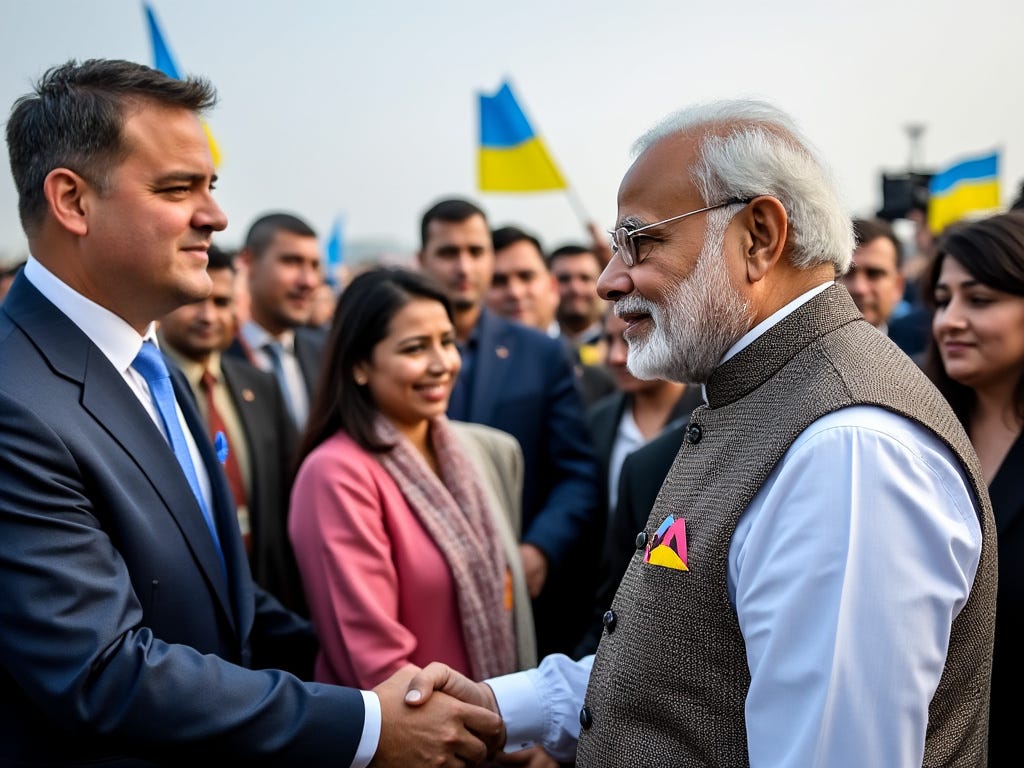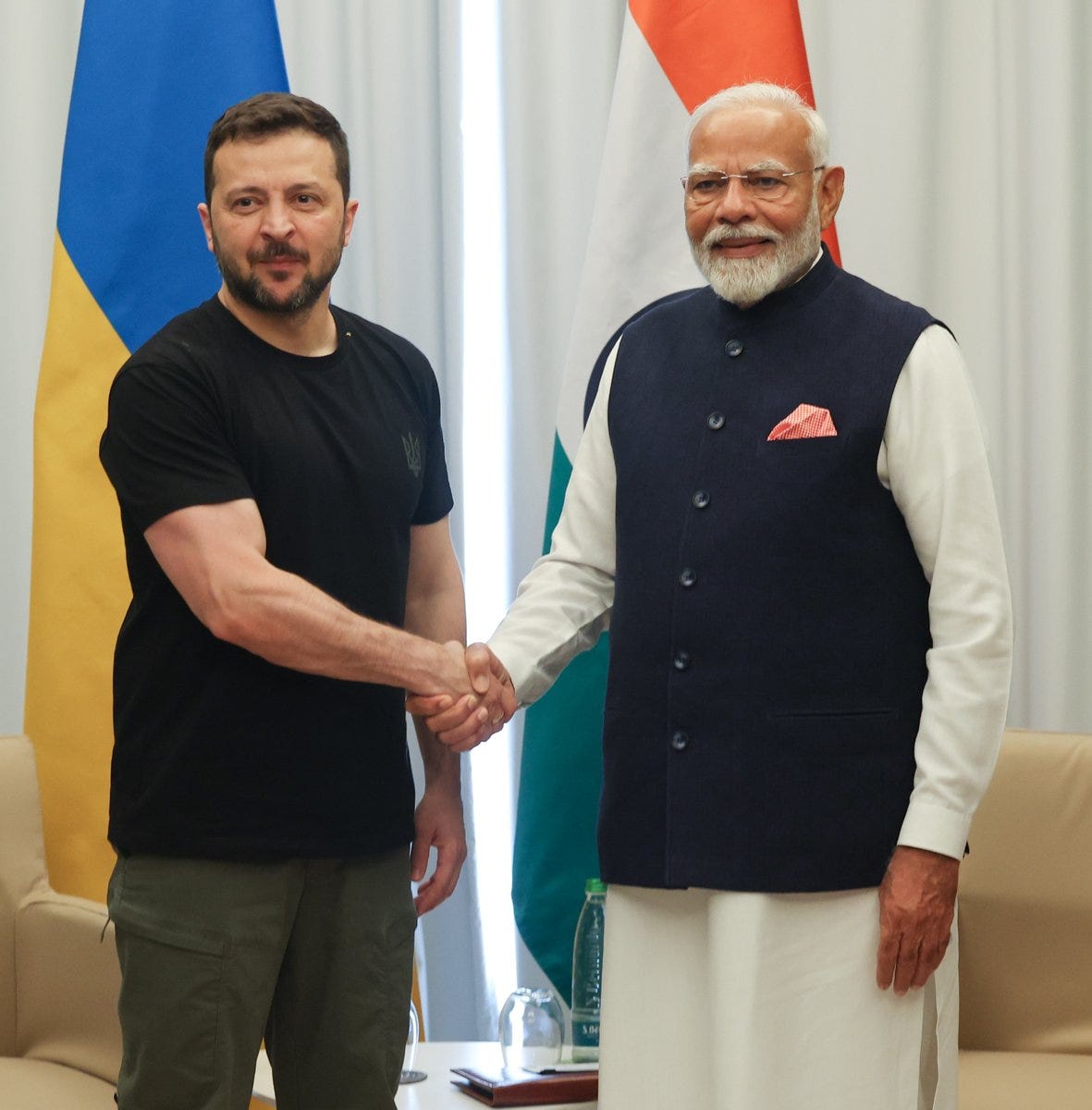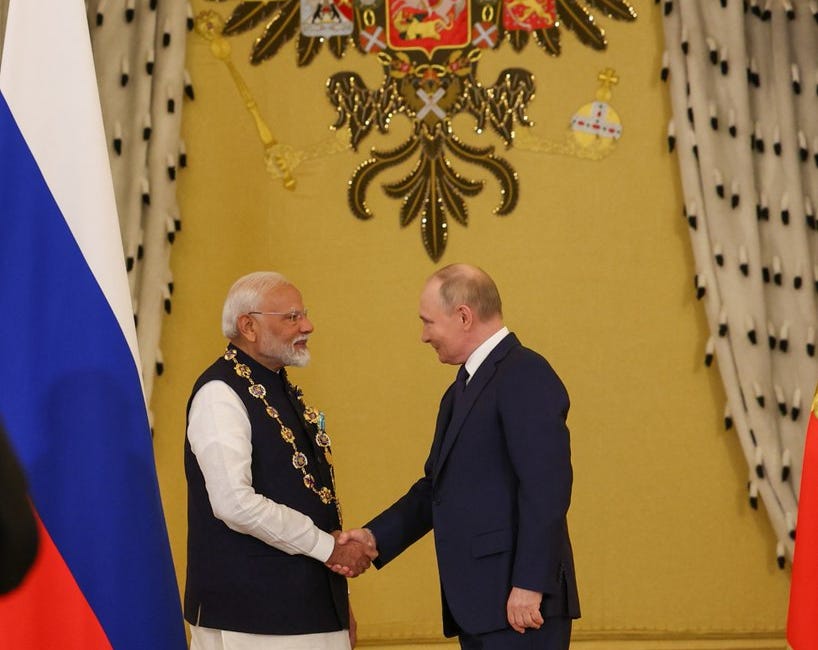PM Modi's Ukraine Visit: A Diplomatic Balancing Act
Beyond diplomatic niceties, the primary aim of the visit is to placate President Zelenskyy, who had openly expressed his annoyance over PM Modi's visit to Russia last month.

Modi's Ukraine Visit: A Diplomatic Balancing Act
Indian Prime Minister Narendra Modi's visit to Kyiv on 23 August, coinciding with Ukraine's National Flag Day, marks a historic first for an Indian leader in Ukraine. This diplomatic move, set against the backdrop of the ongoing Russia-Ukraine conflict— which is anything but one-sided now— comes shortly after PM Modi's high-profile visit to Russia last month, which sparked criticism from both Western nations and Ukraine. President Volodymyr Zelenskyy had then labeled Modi's Moscow trip as a "disappointment and a devastating blow to peace efforts."
Mending Fences and Achieving Balance
Mending Ties
The visit provides India with a crucial opportunity to mend its relationship with Ukraine, which had been strained following Modi's visit to Russia. President Zelenskyy had, dispensing with diplomatic verbiage, then expressed deep dissatisfaction over India's stance on the conflict, and this visit could help smooth over those tensions and placate the ruffled feathers.
Balancing Act
India is attempting to maintain a delicate balance between its historical ties with Russia and its growing strategic partnerships with Western nations. This visit demonstrates India's effort to engage with both sides of the conflict, seeking to preserve its long-standing relations while addressing new geopolitical realities.
Humanitarian Concerns
Modi may use this visit to discuss humanitarian aid and support for Ukraine, potentially offering Indian assistance in reconstruction efforts. This humanitarian angle could help India position itself as a neutral party aiming to contribute positively to the crisis.

Strategic Defence Cooperation
a.) Deepening Industrial and Defence Ties
Prime Minister Narendra Modi’s visit to Kyiv on 23 August, marks a historic moment as the first visit by an Indian Prime Minister to Ukraine. This visit, while set against the complex backdrop of the Russia-Ukraine war, also serves as a pivotal opportunity for India to explore and potentially deepen its industrial and defence ties with Ukraine. As both nations discuss bilateral and multilateral cooperation, the focus may shift to strengthening defence manufacturing partnerships— from warships to armaments and aircraft spare parts— which could be mutually beneficial.
b.) A Win-Win Scenario
India's interest in upgrading its defence capabilities, particularly in acquiring marine engines for warships and improving its large air transport fleet, aligns with Ukraine's need for financial support for its struggling defence companies. Ukrainian defence industries, such as the Antonov plant and the Zorya-Mashproekt complex, have been severely impacted by the ongoing war. Collaboration in these areas could provide India with advanced technology and support Ukraine's defence sector, creating a win-win situation for both countries.
Potential Outcomes and Reactions
a.) Ukraine's Perspective
Ukraine is likely to welcome this visit as an opportunity to garner more international support. President Zelenskyy may seek India's backing for Ukraine's territorial integrity and could push for a stronger stance against Russian aggression, viewing India's engagement as a potential shift in global alliances.
b.) Russian Reaction
Moscow is expected to closely monitor the visit. While Russia may express concern, it is unlikely to strongly criticize India given their long-standing strategic partnership. However, any perceived shift in India's stance could lead to subtle diplomatic tensions, testing the resilience of the Indo-Russian relationship.
c.) Western Response
Western powers are likely to view this visit positively, seeing it as a sign of India potentially moving away from its neutral stance and aligning more closely with the West's position on the conflict. This could enhance India's standing among Western nations but might complicate its relationship with Russia.
Context of Ongoing Conflict
a.) Territorial Gains by Ukraine
Since Prime Minister Modi's visit to Russia last month, Ukraine has launched a surprise counter-offensive that has dramatically altered the dynamics of the conflict. On 6 August 2024, Ukrainian forces initiated a significant and extensive cross-border incursion into Russia’s Kursk region, marking the most substantial Ukrainian military operation on Russian soil since the full-scale invasion in February 2022. Ukrainian troops have reportedly advanced 30-35 kilometers into Russian territory, now controlling an estimated 1,000-1,150 square kilometers.
President Volodymyr Zelenskyy has affirmed this bold offensive, stating that Ukraine is "extending the conflict into the aggressor's land." With control claimed over 74 locations and thousands of Russian civilians evacuated from the region, Ukraine is no longer seen merely as an underdog under attack but as a force capable of taking the fight into Russian territory. This offensive represents a significant shift in the war, marking the first major ground incursion by Ukrainian conventional forces into Russian territory and signaling a new phase in the ongoing conflict.
b.) Extensive Drone Assault on Moscow
On August 21, 2024, Ukraine launched one of its largest drone attacks on Moscow since the conflict began in 2022, marking a significant escalation in its offensive capabilities. Russian officials reported intercepting and destroying 11 drones over Moscow and its surrounding areas, with a total of 45 drones eliminated overnight across various regions. The attack, described by Moscow Mayor Sergei Sobyanin as one of the largest ever, temporarily disrupted air travel at major airports but resulted in no reported casualties.
This assault underscores Ukraine's growing ability to strike deep into Russian territory, targeting critical infrastructure and impacting Russian morale. The drone offensive, part of a broader strategy to weaken Russia's military logistics, signifies a shift in the conflict, bringing the war closer to the Russian heartland.
In Conclusion
PM Modi's visit to Ukraine is a pivotal diplomatic move in India's foreign policy, aiming to repair strained relations with Ukraine while maintaining a delicate balance between Russia and the West1. The reactions from Ukraine, Russia, and the USA will need careful interpretation, as the official communiqués may not fully reveal the underlying sentiments2. The success of this mission could significantly influence India's global standing and its potential role in future peace negotiations. However, the true impact of this visit will only be revealed over time. We will have to wait and see how events unfold.
PM Modi in the August Company of Ukraine President Zelenskyy
Contextual Overview and Significance of the Visit
PM Modi Honoured with the Order of St. Andrew by Russia
Award Presentation to Prime Minister Narendra Modi






……balancing act….must be effect of happening in neighbourhood.